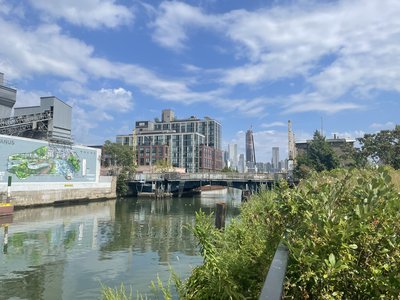The City Council Subcommittee on Zoning and Franchises held a three-hour public hearing this past week to gather input on the Gowanus rezoning.
The Gowanus Neighborhood Coalition for Justice has said the group will not support the rezoning unless the proposal includes funding for the Gowanus Houses and Wyckoff Gardens, a commitment to net zero combined sewage overflow to the Gowanus Canal, and an official community-based task force to oversee the city’s implementation of the rezoning.
“We need a task force to keep the city accountable for their commitment to open space,” said Andrea Parker, executive director of Gowanus Canal Conservancy and a member of the coalition. “We have seen in too many other rezonings the city commit to increased open spaces, but not offering any timeline or funding for it.”
Parker specifically called out the 2005 rezoning of Greenpoint and Williamsburg, which promised to bring hundreds of acres of new park space to the neighborhood. As of today, the city has only delivered 20 percent of the promised greenspace.
“What we’ve seen happen on our sister waterfront shows that the city’s word isn’t enough,” Parker said.
Lynn Newman from climate advocacy group 350 Brooklyn hopes that the city will be similarly forthcoming in its commitment to public housing.
“So far the conversation about funding for public housing has not been transparent,” Newman said. “We do not want an eleventh-hour negotiation to make this rezoning happen.”
Community feedback regarding the rezoning has already pushed the city to take some action. In July, the Department of City Planning released a new Racial Equity Report on Housing and Opportunity after local calls for such research.
The report took neighborhood demographics and income into account, and determined that 20 to 25 percent of the new apartments coming to the neighborhood through the rezoning are projected to be filled by Black residents, while 25 to 37 percent are projected to be filled by Hispanic residents.
These findings eased some concerns about gentrification, and convinced some individuals — including Borough President Eric Adams — to finally announce their support of the rezoning.
The proposal calls for rezoning 80 square blocks of the neighborhood to make way for new developments, including a controversial plan to build on the highly polluted “Public Place” site along the Gowanus Canal.
The rezoning will bring approximately 8,500 new housing units to the neighborhood, including 3,000 permanently affordable units.
“People don’t always agree, but over the past few years we have had a robust and democratic dialogue about the rezoning, which has already changed the plan tremendously,” said Councilman Brad Lander, who represents parts of Gowanus. “This dialogue will continue to shape the rezoning today and for days to come.”
“Too often rezonings have displaced low-income and working-class tenants, strained existing infrastructure, enriched speculators and developers, and changed neighborhoods with too little community input and benefit for longtime residents,” added Lander. “But I believe that if we get it right, the Gowanus rezoning can be different.”



